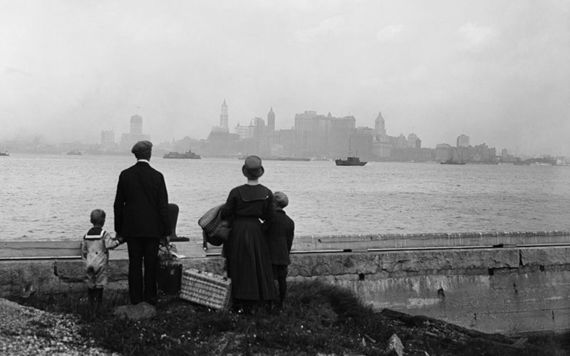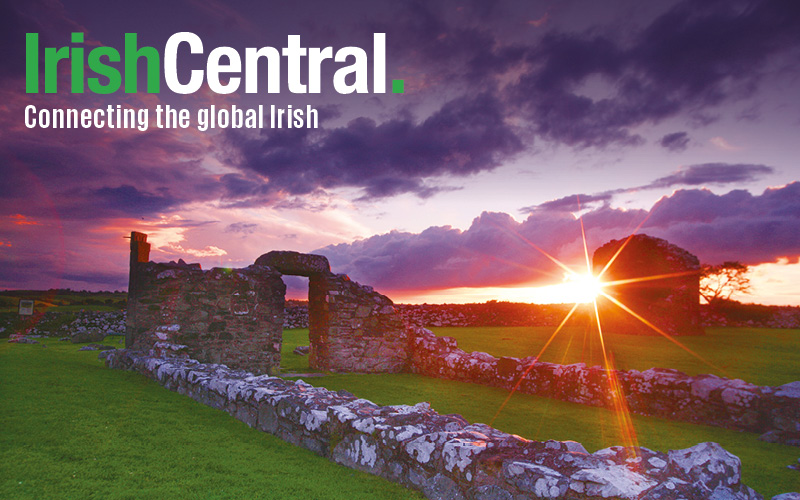Almost everyone in this country is a migrant or the descendant of migrants
If we are not Native American then most of us can trace our ancestors back to a main country of origin within a few generations, if we are not first generation ourselves.
One thing is certain from the records, most of us are not native of this great nation at all. That's just a reassuring myth told to sooth us as our railroads started breaking west past Plymouth Rock and Gettysburg and Wounded Knee.
Our history here, compared to the history of the nations that our ancestors left, is just a drop in the Atlantic ocean of real time.

And let's not forget that when our Irish ancestors arrived here they were menaced and discriminated against by America's first ever anti-immigrant group the Know-Nothings, who wanted to turn us around at our ports of entry and send us back to the land from which we sailed.
All of those hard experiences can be forgotten in one generation, apparently. Every lesson they could have imparted about showing solidarity with other targeted migrants has been quickly unlearned.

But it's a curious thing about the Irish in Ireland, they have watched their sons and daughters emigrate to just about everywhere on earth and that fact is not forgotten there.
Of course, they have politicians who have tried to rise to prominence by bashing and blaming Ireland's small migrant community for every social ill the nation grapples with, but the Irish themselves have consistently refused to take the bait.
As late as last week, two minority-bashing Irish candidates in the European Elections, one of whom had openly acknowledged he was racist, could find no traction with the voting public.
In fact, they were utterly seen off, shown little to no popular support on the national stage. That's because in Ireland there is still a long memory of Irish migrants being targeted and bashed by anti-immigrant groups worldwide.

Remember No Irish Need Apply? The people of clearly Ireland do. They also remember what it felt like to be the insecure tenants of their own nation for centuries. They also remember what it felt like to have their land stolen from them and then almost get blamed for the theft by ruthless oppressors from our neighboring isle.
Those hard lessons have made the Irish more confident about Ireland's warm welcome to migrants, not less. But that's not to say they can't forget. That's not to say that when push comes to shove some even more cynical and talented politician will not transform their genuine grievances into an opportunity to feather his or her own nest.

Peter Casey and Gemma O'Doherty currently represent the far right fringes of Irish public discourse about migrants but they have just had their posteriors handed to them by the Irish electorate.
That's not to say that they or other candidates like them can't find traction at a later date. There is no end to the annual emergence of these pound shop Enoch Powell's, anxious to climb to prominence and power on the backs of the most socially vulnerable.
We should know all about it. Here in America, our own president has called the migrants seeking asylum at our southern border an “invasion.”
“We have people coming into the country or trying to come in...You wouldn't believe how bad these people are,” Trump said. “These aren't people. These are animals.”

This is exactly the same language that was used in the 19th century to attack the fleeing famine-era Irish. Back then we were called poor, disease-ridden, papists, drunks, rapists. So how have so many of us failed to see ourselves in the plight of others now?
Back then we were herded like livestock into the cramped quarters of coffin ships, lacking food and clean water or even fresh air. Disease and death clung to those ships like barnacles, sharks learned to follow them across the Atlantic hoping for a sea burial.
Nearly one-quarter of the 85,000 Irish passengers who sailed to North America onboard these floating charnel houses in 1847 never even reached their destinations.
How have we managed to forget the lessons of a journey like that? When did we look at other migrants and stop seeing ourselves?




Comments